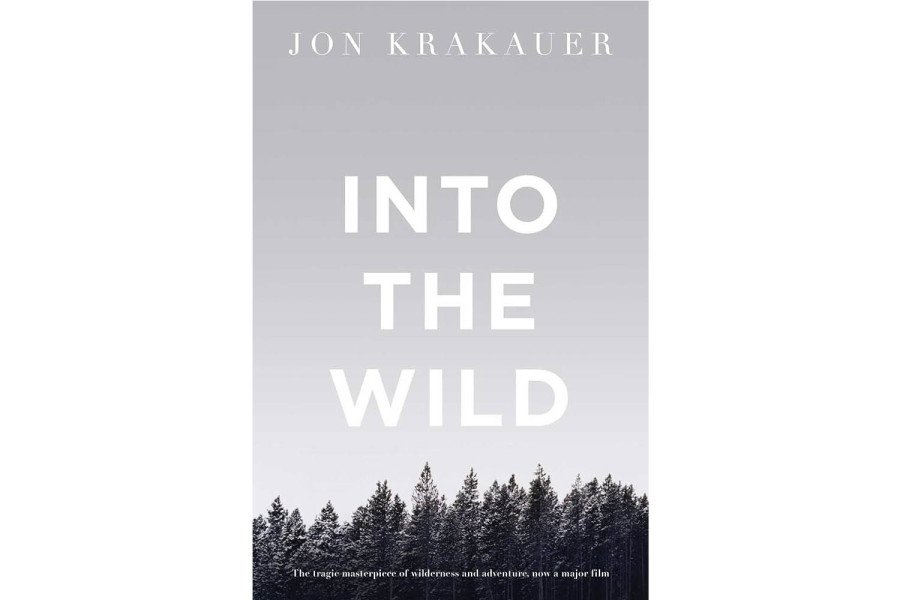Books
When an ill-planned adventure met its fate
Jon Krakauer’s ‘Into the Wild’ chronicles the story of Chris McCandless, whose desire to escape modern life led him to the Alaskan wilderness.
Manisha Bantawa
My friend Namrata suggested that I read ‘Into the Wild’. As an adventure lover, intrigued by the name, I started reading the book.
Written by American writer and mountaineer Jon Krakauer, ‘Into the Wild’ is a 1996 nonfiction book about Christopher Johnson McCandless’s journey towards self-discovery and a nomadic lifestyle. Published in 1996, the book retells the story of McCandless written by Krakauer, which appeared in the January 1993 issue of Outside.
Through the book, Krakauer reassembled the details of McCandless’s life. Admitting an interest that borders on obsession, he searched for the clues to the drives and desires that prompted McCandless, who chose to travel alone into the rough parts of Alaska.
The book presents McCandless’s journey with the broader themes of adventure, idealism, and existentialism inspired by Henry David Thoreau, Jack London, and Leo Tolstoy.
Krakauer went to great lengths to write ‘Into the Wild’ as accurately as possible, visiting places McCandless had been to and interviewing family members, friends, colleagues, and others involved in the story. Krakauer expressed his obsession with the story, dedicating three years of research to its completion.
The book starts with Chris McCandless hitchhiking just outside of Fairbanks, picked up by a traveller, Jim Gallien, on April 28, 1992, on his way to explore the Alaskan wilderness, where he identifies himself as Alexander Supertramp.
Disillusioned with modern life’s materialism and the constraints of societal expectations, the son of wealthy parents, McCandless, shortly after graduating in 1990, leaves behind his family without informing them, donating his law school scholarship to OXFAM to explore the wilderness. McCandless wanted to have physical, mental, and spiritual growth as a result of communion with nature.
This reflects our desire to escape from the mundane routine of life. Some of us are on a soul-searching mission or re-evaluating our lives after falling into yet another existential crisis.
McCandless was bored by civilisation and longed to pit himself against nature. When their son disappeared, his family hired a private investigator to find him, but their efforts were in vain.
McCandless spent the next two years travelling across the United States, visiting the deserts of the American Southwest, the Pacific Coast, and the Great Plains, living in trailers.
He survived by hitchhiking, working odd jobs, and relying on the kindness of strangers. Throughout his travels, he embraced a minimalist lifestyle, often without money or possessions.
One of the key moments in McCandless’s journey was his time in Carthage, South Dakota, where he worked for a man named Wayne Westerberg. Westerberg became a friend and confidant to McCandless, who confided in him his desire to live off the land in Alaska. This dream of surviving in the wild, untouched by modern society, became McCandless’s ultimate goal.
However, while he cherished being free from societal obligations, he struggled to connect with people on a deeper level, often leaving relationships behind abruptly as he moved from place to place.
In April 1992, McCandless hitchhiked to Alaska, where he intended to live in the wilderness for several months. He arrived near Denali National Park with minimal supplies, carrying only a 10-pound bag of rice, a rifle, a collection of books, and some basic camping gear. He planned to live off the land, hunting and foraging for food and immersing himself in nature.
What follows is the tale of adventure and hardships as he survives for approximately 119 days in the Alaskan wilderness, living off roots, berries, and games while keeping a journal documenting his odyssey.
McCandless set up camp in an old bus called the ‘142 Magic Bus,’ which he stumbled upon during his trek. The bus became his base of operations as he attempted to live out his dream of self-sufficiency. He documented his experiences in a journal, detailing his successes and struggles in hunting and gathering food. McCandless’s misfortune is retold in the magic bus he lived on for 119 days. He had miscalculated the difficulty of surviving in such an environment without proper equipment or knowledge.
Staying in the wilderness, McCandless reflects on the irony of his quest to escape materialistic life, only to ultimately feel regret and yearn for human connection. One of his final entries was a plea for forgiveness, on a paper “I have had a happy life and thank the Lord. Goodbye and may God bless all!”
Krakauer further explains the similar adventures of Gene Rossellini, John Mellon Waterman, and Everett Ruess, who wanted to live off the land.
Into the Wild is a book about the loss of innocence. One of the key questions Krakauer addresses is whether McCandless was simply just a reckless adventurer or whether his actions were part of a larger quest for meaning.
McCandless’s story resonates with many readers because it taps into a universal desire for freedom, self-discovery, and a break from the constraints of modern society.
His journey reflects the human desire to escape from societal pressures, materialism, and the expectations imposed on individuals by family, career, and culture. By abandoning his conventional life and venturing into the wilderness, McCandless sought to live authentically and on his terms, tapping into a fundamental wish to explore personal identity without external influence.
At some point, many people feel the urge to detach from the complexities of modern life and find simplicity and meaning in nature or solitude. McCandless’s quest for an unfiltered, raw experience of life—free from the distractions and obligations of society—strikes a chord with those who have felt confined by routine and responsibility.
At the same time, McCandless’s story resonates because it reflects the risks and consequences of such a pursuit. The desire for freedom and self-discovery is powerful; it also requires balance, preparation, and recognition of the reality and dangers of life. This combination of inspiration and caution is what makes his story universally compelling.
The magic bus reminded me of the song ‘Manchari’ by Sushant Ghimire, where a similar representation of the bus is portrayed with the actor searching for the meaning of his existence.
‘Into the Wild’ is an international bestseller printed in 30 languages in 173 editions and formats.
Into the wild
Author: John Krakauer
Publisher: Villard
Year: 1996




 15.12°C Kathmandu
15.12°C Kathmandu










